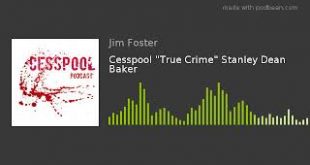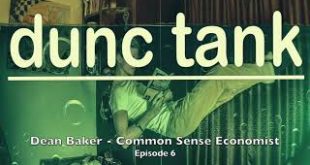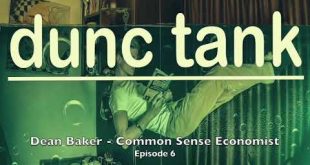Source: https://www.podbean.com/media/share/pb-db653-a39c4f A semi true crime profile on Stanley Dean Baker a cannibal from Montana, with really bad jokes mixed in! Enjoy.
Read More »New year, old arguments
from Peter Radford “The universe is made of energy, matter, and information, and while energy and matter are here by default, information needs to find ways to emerge. This is not always easy” Cesar Hidalgo, “Why Information Grows — The Evolution of Order, from Atoms to Economies” Why is it the economics still restricts itself to constructing its narratives around concepts like labor and capital? Neither are very precise. Both are amalgams of more fundamental concepts. And, even in...
Read More »Dean Baker – Common Sense Economist
Dean Baker is one of the few economists who predicted the collapse of the housing bubble, and is the co-founder of CEPR, an economics policy think tank. We talked about recession risks for 2019, the Federal Reserve, the stock market and inequality, and what economics has to say about climate change.
Read More »Dean Baker – Common Sense Economist
Dean Baker is one of the few economists who predicted the collapse of the housing bubble, and is the co-founder of CEPR, an economics policy think tank. We talked about recession risks for 2019, the Federal Reserve, the stock market and inequality, and what economics has to say about climate change.
Read More »How to re-establish trust in economics as a science
from Lars Syll Students all over the world are increasingly questioning if the kind of economics they are taught — mainstream economics — really is of any value. Some have even started to question if economics is a science. Two ‘Nobel laureates’ in economics — Robert Shiller and Paul Krugman — have lately tried to respond: Critics of “economic sciences” sometimes refer to the development of a “pseudoscience” of economics, arguing that it uses the trappings of science, like dense...
Read More »Romer’s trouble with macro
from Asad Zaman Let us start with Five Fundamental propositions, which would be startling to the general public, but familiar to my current audience of heterodox economists. Mainstream modern economic theory is complete garbage. This is true of Micro, Macro, Econometrics, Trade, Monetary, Industrial Organization — EVERYTHING. It is very EASY to prove this assertion. Fundamental principles on which the entire discipline is built are easily proven to be wrong. The axiomatic theory of human...
Read More »Resolutions to improve debates on economic policy in 2019
from Dean Baker Okay, it’s that time of year when we are all supposed to commit ourselves to performing nearly impossible tasks over the next twelve months. I will play the game. Here is the list of areas where I will try to bring economics into economic policy debates in 2019. 1) Patent and copyright monopolies are government policies: This one is pretty simple, but that doesn’t mean it is easy. It should be pretty obvious that these and other forms of intellectual property are...
Read More »Dean Baker Live Stream
The essence of scientific reasoning
from Lars Syll In deductive reasoning all knowledge obtainable is already latent in the postulates. Rigour is needed to prevent the successive inferences growing less and less accurate as we proceed. The conclusions are never more accurate than the data. In inductive reasoning we are performing part of the process by which new knowledge is created. The conclusions normally grow more and more accurate as more data are included. It should never be true, though it is still often said, that...
Read More »Class-conflict theory of inflation
from Asad Zaman Economists do not understand inflation. Daniel K. Tarullo. Former Governor, Federal Reserve Board should surely be in a position to know. I will list some key conclusions from his paper with the revealing title: Monetary Policy Without a Working Theory of Inflation : We do not, at present, have a theory of inflation dynamics that works sufficiently well to be of use for the business of real-time monetary policy-making Many … good monetary policymakers … have an almost...
Read More » Real-World Economics Review
Real-World Economics Review






